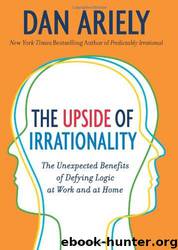Upside of Irrationality by Dan Ariely

Author:Dan Ariely
Language: eng
Format: mobi, epub
Tags: Decision-Making & Problem Solving, Psychology, General, Self-Help, Personal Growth, Education
ISBN: 9780007354771
Publisher: 1//19
Published: 2010-01-01T02:36:34.531000+00:00
* * *
“Dan, when we got this car last year I was ecstatic, but now it no longer makes me happy. What do you think about renovating the kitchen?”
* * *
An illustrative study of this principle was conducted by David Schkade and Danny Kahneman. They decided to inspect the general belief that Californians are happier—after all, they live in California, where the weather is usually wonderful.* Somewhat unsurprisingly, they found that midwesterners think that fair-weather Californians are, overall, considerably more satisfied with their lives, while Californians think that midwesterners are considerably less satisfied overall with life because the latter have to suffer through long, subzero winters. Consequently, people from both states expect that a Chicagoan moving to sunny California will see a dramatic improvement in lifestyle, while the Angeleno moving to the Midwest will get a dramatic reduction in happiness.
How accurate are these predictions? It turns out that they are somewhat accurate. New transplants do indeed experience the expected boost or reduction in quality of life due to the weather. But, much like everything else, once adaptation hits and they get used to the new city, their quality of life drifts back toward its premoving level. The bottom line: even if you feel strongly about something in the short term, in the long term things will probably not leave you as ecstatic or as miserable as you expect.
Overcoming Hedonic Adaptation
Given that hedonic adaptation is clearly a mixed bag, how, you might wonder, can we use our understanding of it to get more out of life? When adaptation works in our favor (such as when we get used to living with an injury), we should clearly let this process take place. But what about instances when we wish not to adapt? Can we somehow extend the euphoric feeling of a new car, city, relationship, and so on?
One key to changing the adaptation process is to interrupt it. This is exactly what Leif Nelson and Tom Meyvis did. In a set of experiments, they measured how small interruptions—which they called hedonic disruptions—influence the overall enjoyment and irritation we get from pleasurable and painful experiences. In essence, they wanted to see if taking breaks in the middle of pleasurable experiences would enhance them and if disrupting a negative experience would make it worse.
Before I describe their experiments and the results, think about a chore you don’t particularly look forward to doing. Maybe it’s preparing your taxes, studying for an exam, cleaning all the windows in your house, or writing postholiday thank-you letters to your horrid Aunt Tess and everyone else in your very large family. You’ve set aside a significant block of time to knock out this annoying task in a single day, and now you face this question: is it better to complete the chore all at once or to take a break in the middle? Alternatively, let’s say you’re soaking in a hot tub with a cool glass of raspberry iced tea, eating a bowlful of fresh strawberries, or luxuriating in a hot-stone massage.
Download
This site does not store any files on its server. We only index and link to content provided by other sites. Please contact the content providers to delete copyright contents if any and email us, we'll remove relevant links or contents immediately.
| Biomathematics | Differential Equations |
| Game Theory | Graph Theory |
| Linear Programming | Probability & Statistics |
| Statistics | Stochastic Modeling |
| Vector Analysis |
Modelling of Convective Heat and Mass Transfer in Rotating Flows by Igor V. Shevchuk(6440)
Weapons of Math Destruction by Cathy O'Neil(6281)
Factfulness: Ten Reasons We're Wrong About the World – and Why Things Are Better Than You Think by Hans Rosling(4742)
A Mind For Numbers: How to Excel at Math and Science (Even If You Flunked Algebra) by Barbara Oakley(3308)
Descartes' Error by Antonio Damasio(3279)
Factfulness_Ten Reasons We're Wrong About the World_and Why Things Are Better Than You Think by Hans Rosling(3239)
TCP IP by Todd Lammle(3185)
Fooled by Randomness: The Hidden Role of Chance in Life and in the Markets by Nassim Nicholas Taleb(3124)
The Tyranny of Metrics by Jerry Z. Muller(3073)
Applied Predictive Modeling by Max Kuhn & Kjell Johnson(3071)
The Book of Numbers by Peter Bentley(2968)
The Great Unknown by Marcus du Sautoy(2695)
Once Upon an Algorithm by Martin Erwig(2650)
Easy Algebra Step-by-Step by Sandra Luna McCune(2636)
Lady Luck by Kristen Ashley(2583)
Police Exams Prep 2018-2019 by Kaplan Test Prep(2549)
Practical Guide To Principal Component Methods in R (Multivariate Analysis Book 2) by Alboukadel Kassambara(2545)
All Things Reconsidered by Bill Thompson III(2394)
Linear Time-Invariant Systems, Behaviors and Modules by Ulrich Oberst & Martin Scheicher & Ingrid Scheicher(2371)
